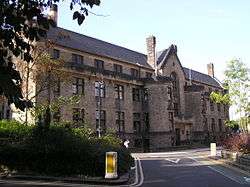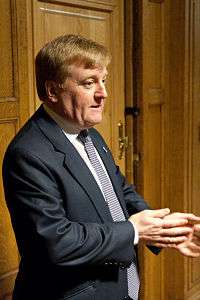Glasgow University Dialectic Society
 | ||||||||||||||||||||||||
| Formation | 1451 | |||||||||||||||||||||||
|---|---|---|---|---|---|---|---|---|---|---|---|---|---|---|---|---|---|---|---|---|---|---|---|---|
| Location | ||||||||||||||||||||||||
Membership | 100 | |||||||||||||||||||||||
President | Bethany Garry | |||||||||||||||||||||||
Honorary Secretary | Harry Coloe | |||||||||||||||||||||||
Colours |
| |||||||||||||||||||||||
Parent organization | University of Glasgow | |||||||||||||||||||||||
| Affiliations |
Glasgow University Union, Students' Representative Council, Queen Margaret Union | |||||||||||||||||||||||
| Website | www.gudialectic.co.uk | |||||||||||||||||||||||
The Glasgow University Dialectic Society, re-instituted in 1861, is a student society at the University of Glasgow, Scotland, committed to the promotion of debating, logic, ethics and literary discussion at the University. The Society is independent and open to all students of the University, but maintains strong links with debating at Glasgow University Union.
History
The date of the Society's foundation is contested; the earliest paper records of the Society are dated before 1770, and there are, moreover, mentions within the University records of a society existing and being open to students who took Logic, back when the University still resided within Glasgow Cathedral. Pope John Paul II issued a 'Papal Letter' to the Society upon his visit to Scotland in 1982, which recognised the Society's claim to have been established in 1451. The Society was formally re-instituted in 1861. The Society has led the UK's university debating culture since 1953. In 1955, it won the Observer Mace, now the John Smith Memorial Mace, named after the deceased GUU debater and former leader of the British Labour Party. The GUU has since won the Mace debating championship sixteen more times, far more than any other university. The GUU has also won the World Universities Debating Championships five times, more than any other university or club in the series' history.
Former members
Notable former members of the Society include:
- Sir Menzies Campbell, former leader of the Liberal Democrats
- Donald Dewar, former First Minister of Scotland
- Liam Fox, Secretary of State for Defence
- Brian Gill, Lord Gill, Lord Justice Clerk
- Derry Irvine, Lord Irvine, former Lord Chancellor
- Charles Kennedy, former leader of the Liberal Democrats, Rector of the University
- Andrew Neil, journalist and broadcaster
- Nicholas Parsons, media personality
- John Smith, former leader of the Labour Party
Activities

The Society organises a variety of events during term-time, including weekly informal Thursday debates at the Queen Margaret Union. In October, the Society holds a New Members' Dinner, followed in March by the Annual Dinner(this year it will be held on 25 February as a special Anniversary Celebration), held shortly before the AGM. There is also an Inter-Board Debate, held between the boards of the four major student bodies (Glasgow University Union, Queen Margaret Union, Students' Representative Council and Glasgow University Sports Association), and the Honorary President's Debate, as well as a St Andrews-tide football game and a Sports Day, the Dialectic Olympics. The Society holds a number of more informal events, especially during Freshers' Week, to attract new members.
Three internal competitions are organised by the Society: the Reftable, for new speakers; the Intra-Varsity, a pro-am competition; and the John Duncan Debate, between incoming and outgoing club leaders of the Glasgow University Union's Parliamentary Clubs.
The Dialectic Society, along with the Glasgow University Medico-Chirurgical Society and Glasgow University Athletic Club, was one of the founding societies of the Glasgow University Union in 1885, as well as being instrumental in establishing the Glasgow University Students' Representative Council the following year, and remains an active contributor to the activities of both organisations. The GUU was originally an all-male organisation, having been established before the admission of women to the University in 1892. At this time, women were educated at Queen Margaret College, and opportunities for women students to debate existed at the Queen Margaret Union. This activity largely ceased following the admission of women to the GUU in 1980, however the Dialectic Society has recently been involved in a number of events aimed at its revival.
Groundings
| Discipline | Humanities, arts, social sciences |
|---|---|
| Language | English |
| Edited by | Qadir Malik |
| Publication details | |
| Publisher |
Glasgow University Dialectic Society (United Kingdom) |
Publication history | 2007-present |
| Frequency | Annually |
| Indexing | |
| ISSN |
1754-7474 (print) 1755-2702 (web) |
| Links | |
The society produces Groundings, an interdisciplinary journal publishing work in the humanities, arts, and social sciences.[1]
Groundings was established by the Society in 2007 and has since been published annually. The purpose of the journal is to provide an opportunity for undergraduate students at the University to have their work peer-reviewed and published in an accessible academic resource as a stepping stone to publication in more mainstream scholarly journals. As such, all entries are written by undergraduate students, and the editorial board is made up of undergraduates, although there exists an advisory panel mainly comprising academics of the University drawn from a range of disciplines.
There are generally around ten articles per volume, each written and peer-reviewed by undergraduate students, and each volume of the journal follows a theme, to which it is intended the articles in that volume will relate. The theme for the first volume was "Identity and Commemoration", and for the second volume, "Individuals, institutions, and the relations between them". The themes used are intentionally broad in order to accommodate the largest variety possible between submissions, whilst ensuring each volume retains a sense of inherent direction.
The journal is produced in paper and electronic form, with initial funding for publication provided by the Chancellor's Fund. Print copies are made available to a number of depositories in the United Kingdom, including the Glasgow University Library, and the journal is also available to read online.
Management

The management of the Society is entrusted to a Board elected at the Annual General Meeting (AGM). The Board consists of a President, Vice-President, Honorary Secretary, Treasurer, Assistant Secretary, Whip Secretary, Publicity Secretary, Macer, Social Convenor and two First Year Representatives.[2] The Convenors of Debates of the Glasgow University Union and Queen Margaret Union and the Society's immediate Past President are also ex officio members of the Board. The President, Vice-President, Honorary Secretary, Treasurer and Assistant Secretary form the Executive. The current President is Marc Fryer.
Some quirks of the electoral procedure at the AGM are that posts are filled in descending order, allowing those who failed to win more important posts to stand for others, and that candidates must leave the room while a vote is taken on them. The AGM was traditionally held at the end of the University's Candlemas Term, around the middle of March. Despite the new semester-based structure of the University's academic year, this remains the case and the AGM is now held shortly before the end of the teaching period of the second semester, which is separated from the exam period by the Easter vacation.
The Society at its AGM also elects an Honorary President, up to eight Honorary Vice-Presidents and up to four Honorary Life Members. The current Honorary President is Noel Peacock (Emeritus Professor of the University of Glasgow School of Modern Languages).
One of the Honorary President's duties is to chair the Honorary President's Debate, held in February each year. Some years this is a debate organised on a special topic, but other years it is the same event as the Inter-board debate. between representatives of the Boards of the four main student bodies at the University: the Glasgow University Union, the Queen Margaret Union, the Sports Association and the Students' Representative Council. If not chaired by the Honorary president, then the Inter-board debate is chaired by the President of the Society
References
- ↑ "About us". www.groundings-ancients.co.uk. Retrieved 31 March 2016.
- ↑ "Committee". Glasgow University Dialectic Society. Retrieved 9 May 2015.
The archives of Glasgow University Dialectic Society are maintained by the Archives of the University of Glasgow (GUAS).
